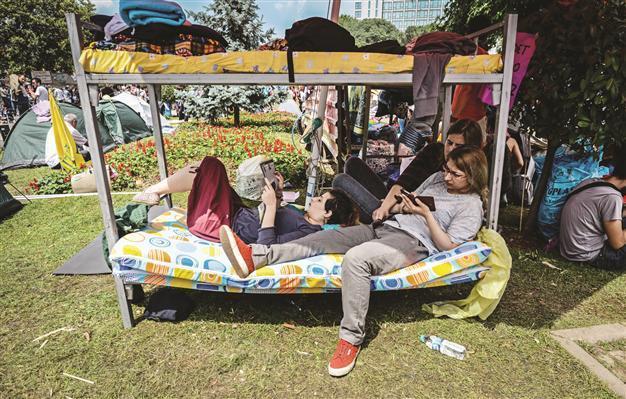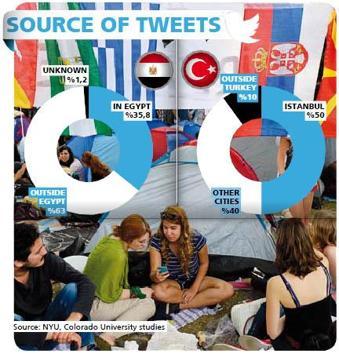Tweet matters between Taksim-Tahrir squares
Güneş Kömürcüler ISTANBUL - Hürriyet Daily News

Social media, mainly the micro-blogging site Twitter, has played an important role both in the protests in Turkish Taksim Square and Egyptian Tahrir Square. Daily News Photo, Emrah Gürel
Social media, especially the micro-blogging site Twitter, has played an important role both in the protests in Taksim Square and Tahrir Square, but the source of the tweets differed in the two cases.
More than 90 percent of over 15 million tweets directly related to the protests against the demolition of Gezi Park in Taksim, over 80 percent of which were posted in Turkish, were sent from Turkey, a recent NYU study has shown, while only 35 percent of the top tweeters during the Egyptian revolution were actually in the country, according to a Colorado University study.
“This is really amazing. Any other country, even Egypt, had not seen such twitter traffic as Turkey did during social riots,” İsmail Hakkı Polat, president of the social media department of Istanbul-based Kadir Has University, told the Hürriyet Daily News yesterday.
Turkish Prime Minister Recep Tayyip Erdoğan had recently described Twitter as a “menace,” following the heavy traffic that was witnessed on Twitter during the countrywide protests.
Over 15 million tweets using the most popular three hashtags of the protests, #occupygezi, #direngeziparki, and #geziparki, were sent between last Wednesday, when the protests started to become heated, and June 5, in Turkey, according to the data compiled by the Turkish social media researcher Socialdigger.org. A report of the New York University’s Social Media and Political Participation showed that, the hashtag #direngezipark had been used in more than 1.8 million tweets from June 2 to June 3. In comparison, the most popular hashtag, #jan25, was used in less than one million tweets during the entire Egyptian revolution. The protests had begun by January 25, 2011 in Egypt.
“Given that around 85 percent of geocoded tweets are still being sent from within Turkey, the intensity in the use of social media in this particular protest makes it a unique case from a comparative perspective,” the NYU report said.
 No connection in squares
No connection in squaresMany people have been complaining about the problems in their internet connection via their mobile phones. Some had claimed that mobile operators were ordered to block access to their network.
Turkey’s biggest mobile operator Turkcell denied these claims via its official Twitter account. The company said it had at no time received a government request to cut off access to its mobile networks. TTNET, Turkey’s biggest internet service provider, also denied such claims.
“Millions of tweets are sent mainly from specific regions and squares for more than 10 days. Mobile operators and internet service providers need to increase their GSM and 3G capacity specifically in the areas where the protests are concentrated by using mobile base stations,” Polat said. Mobile operators stated that the data traffic increased around 30 percent in the last week.
A telecommunications expert noted that mobile communication and internet were also interrupted by jammers in the areas where thousands of people came together for protests.
Vodafone Turkey said to Daily News that the company had observed an extraordinary increase of data traffic for specific locations up to 4 to 5 times above the daily average, due to the high usage of social media, in particular for sending images and videos over mobile. “For this, we have set-up a dedicated team of 100 technical staff working 24/7 on this case and increased the network capacity through optimizations on base stations” the company said.

 No connection in squares
No connection in squares